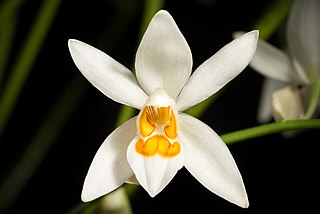
Coelogyne is a genus of 594 species, which are sympodial epiphytes from the family Orchidaceae, distributed across India, China, Indonesia and the Fiji islands, with the main centers in Borneo, Sumatra and the Himalayas. They can be found from tropical lowland forests to montane rainforests. A few species grow as terrestrials or even as lithophytes in open, humid habitats. The genera BolborchisLindl., HologynePfitzer and PtychogynePfitzer are generally included here. The genus is abbreviated Coel. in trade journals.
Black orchid or Black Orchid may refer to:

Coelogyne nitida is a species of orchid in the Coelogyne genus.

Coelogyne pandurata is a species of orchid. It is found in Malaysia, Sumatra, Borneo and the Philippines as a large sized, hot growing epiphyte found on large trees near rivers or terrestrial with well-spaced, strongly compressed, oblong or suborbicular, sulcate pseudobulb carrying 2, apical, plicate, elliptic-lanceolate, leaves with a stout petiole that blooms in late spring-summer out of the center of new leads with up to 15 flowers on a terminal, arched to pendant, 6 to 12" [15 to 30 cm] long, racemose inflorescence. The simultaneously opening flowers are highly fragrant of honey but are short lived. This orchid needs wire basket culture as it spreads out quite rapidly and sphagnum with wood chips as media works best and the best time to repot is when the new lead emerges.

Coelogyne barbata is a species of orchid. It is a shade-loving orchid that blooms in the months of October–November. It occurs in the Himalayas, Nepal, India, China and Myanmar. It grows epiphytic on trees or lithophyte on rocks in lower montane forests at an altitude of 1000 to 1800 meters above sea level. It is also found in Phalee but is rare. It has long, broad leaves and a bulb stem that grows from the roots. It blooms in September- November. It's a shade loving orchid.

Coelogyne corymbosa is a species of orchid.

Coelogyne cristata is an epiphytic orchid that comes from cool, moist areas of the eastern Himalayas and Vietnam. It blooms every spring, before the snow begins to melt. Its genus name Coelogyne originates from two Greek words, koilos ("hollow") and gyne ("woman"), because of the orchid's pistil. Cristata takes its species name from crista, the Latin word for "comb", because of the look of the flower's lip.

Coelogyne flaccida is a species of orchid that is native to southeast Asia and northeastern South Asia. Cultivated as an ornamental plant, it is also known as the bearded coelogyne and the loose coelogyne.

Coelogyne fuscescens is a species of orchid. It is found in Nepal, India, Sikkim, Bhutan, lower Myanmar, China and northeastern Thailand.

Coelogyne lawrenceana is a species of orchid. It is endemic to Vietnam.

Coelogyne rochussenii is a species of orchid.

Coelogyne tomentosa is a species of Orchid.

Coelogyne trinervis is a species of orchid. It is native from Indo-China to west and central Malesia.

Coelogyne viscosa is a species of orchid.

The Coelogyninae are an orchid subtribe in the tribe Arethuseae.

Coelogin is a phenanthrenoid found in the high altitude Himalayan orchid Coelogyne cristata. This molecule has a phenanthro[4,5-bcd]pyran structure.

Coeloginin is a phenanthrenoid found in the high altitude Himalayan orchid Coelogyne cristata. This molecule has a phenanthro[4,5-bcd]pyrone structure.

Coeloginanthrin is a phenanthrenoid found in the orchid Coelogyne cristata.

















